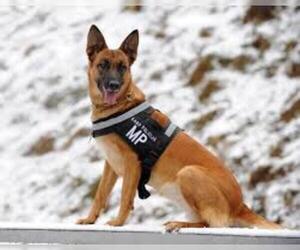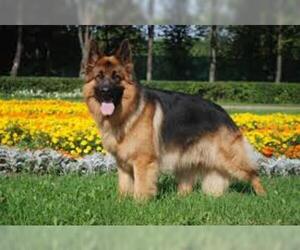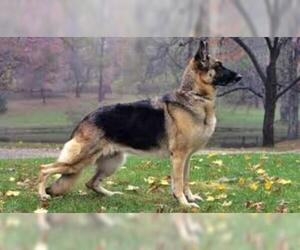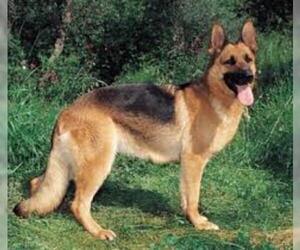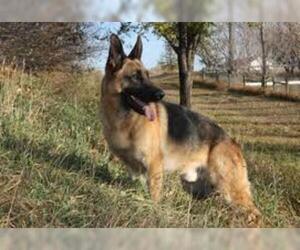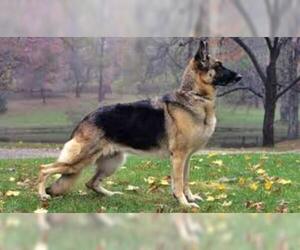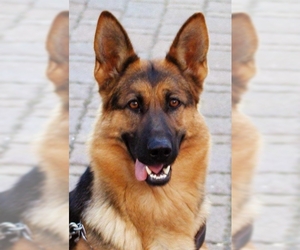
All about German Shepherd Dog dog breed
A.K.A. :Alsatian, Alsatian Wolf Dog, Shepherd Dog, GSD, Deutscher Schäferhund, Schäferhund, Berger Allemand, Pastore Tedesco, Perro de Pastor Alemán, Alsatian Dog
Size
Grooming requirements
Exercise requirements
Good with other dogs
Watchdog ability
Energetic
Training requirements
Playful
Affectionate
Good with other pets
Good with children
Good with strangers
Winter
Summer
Healthiness
Protective
Life Span
| Pure Breeds | Member |
| Breeds A - Z | G |
| Breeds by Group | Herding |
| Breeds by Trait | High Stamina Dog Breeds Smartest Dog Breeds |
| Overview: | The German Shepherd Dog, a truly iconic breed, originated in Germany in the late 19th century, primarily for herding sheep. They are easily recognizable by their athletic, medium-to-large build, typically weighing between 50-90 pounds, with a distinct double coat that can be black and tan, sable, or solid black. Known for their intelligence and loyalty, German Shepherds possess a remarkably trainable and courageous temperament, making them exceptional working dogs in fields like police and service work. While generally good with families when properly socialized, their high energy levels and need for mental stimulation make them unsuitable for apartment living without significant daily exercise. Prospective owners should be aware of common health concerns such as hip and elbow dysplasia, as well as degenerative myelopathy, underscoring the importance of responsible breeding and regular veterinary care. |
F.A.Q.
All You Need to Know About the German Shepherd Dog Breed
The German Shepherd Dog (GSD) is a highly intelligent and versatile breed originating from Germany, renowned for its strong work ethic and loyal nature. Physically, they are medium-to-large with a strong, agile build, a distinctive double coat (often black and tan), and alert, expressive eyes. Their temperament is typically confident, courageous, and calm, but also playful and affectionate with their families. GSDs are excellent family pets, provided they receive early socialization and consistent training; however, their size and exercise requirements make them generally unsuitable for apartment living. They need significant daily exercise and mental stimulation to prevent boredom and destructive behaviors. Grooming is moderate, with regular brushing to manage shedding. Common health considerations include hip and elbow dysplasia, bloat, and degenerative myelopathy. Potential owners should be prepared for an active, engaging companion who thrives on purpose.German Shepherd Dog Weight: On average, a healthy adult German Shepherd Dog weighs between 50-90 pounds.
- Males: Typically range from 65-90 pounds.
- Females: Generally lighter, weighing between 50-70 pounds.
How Tall is a German Shepherd Dog? Understanding German Shepherd Dog Height
For those curious about the German Shepherd Dog height, you've come to the right place! We'll give you a clear picture of the average size of these magnificent canines.The typical adult German Shepherd Dog height, measured at the shoulder (withers), falls within a specific range:- Males: Generally stand between 24 to 26 inches tall.
- Females: Are slightly smaller, usually measuring between 22 to 24 inches tall.
The German Shepherd Dog breed exhibits a variety of stunning colors. AKC recognized German Shepherd Dog colors include: Black and Tan, Black and Cream, Black and Red, Black and Silver, and solid Black. Other officially recognized patterns by the AKC are Sable (agouti), which can range from light to very dark, and solid White, which is recognized by the AKC but disqualifies the dog from conformation showing.Beyond the standard, several rare coat types and exotic German Shepherd Dog variations exist, though these are typically not recognized by major kennel clubs like the AKC for show purposes and may even be disqualifications. These include: Blue German Shepherd Dog, characterized by a dilute black pigment; Liver (Chocolate) German Shepherd Dog, a dilute brown pigment; Isabella (Lilac) German Shepherd Dog, a very rare dilute of liver; and Panda German Shepherd Dog, a striking piebald pattern with white markings. While visually distinct, Merle German Shepherd Dogs are generally considered to be the result of crossbreeding with other breeds carrying the merle gene and are not part of the purebred German Shepherd Dog genetic makeup. Pricing for these rare German Shepherd Dog colors can vary significantly from standard colors due to their uniqueness.
The German Shepherd Dog personality is renowned for its exceptional intelligence, loyalty, and versatility. They are courageous and confident, often displaying a noble demeanor. While not typically overtly friendly with strangers, a well-socialized German Shepherd Dog will be watchful and reserved, assessing new situations before engaging. Their loyalty to their family is unwavering, making them excellent, protective companions.
In terms of sociability, early and consistent socialization is crucial for a well-adjusted German Shepherd Dog. They thrive on having a purpose and mental stimulation. With children they are raised with, they can be wonderfully patient and protective, but supervision is always recommended, especially with very young children. Their behavior with other pets depends heavily on individual temperament and early exposure; generally, they can coexist peacefully with other animals when properly introduced and trained. Regarding adaptability to apartment living, while German Shepherds are adaptable, their high energy levels and need for mental and physical exercise mean they are generally not ideal for small apartments unless their owners are committed to providing ample daily opportunities for walks, training, and play. They are happiest with a yard and an active lifestyle. Overall, the temperament of German Shepherd Dog is one of a dedicated, intelligent, and capable companion, eager to please and form a strong bond with their human family.The German Shepherd Dog temperament is characterized by a unique blend of noble confidence and deep loyalty, making them exceptional companion dogs. They are known for being highly intelligent, easily trainable, and possess a strong desire to please their owners. While not overly demonstrative, they form incredibly strong bonds with their families and are fiercely protective.
Regarding friendliness and sociability, German Shepherds typically exhibit a reserved demeanor with strangers. They are not usually "everyone's friend" and can be aloof, preferring to observe before engaging. However, once they accept someone, their loyalty is unwavering. Early and consistent socialization is crucial to ensure they develop into well-adjusted adults, comfortable in various situations.With children, German Shepherds are generally good, often displaying a patient and protective nature. Their herding instincts can sometimes manifest as gentle nudging, but supervision is always recommended, especially with very young children. Their behavior with other pets can vary; many can live harmoniously with cats or other dogs if raised together from a young age and properly socialized. However, their strong prey drive can be an issue with smaller, unfamiliar animals.Adaptability to apartment living is challenging. German Shepherds are high-energy dogs that require significant daily exercise and mental stimulation. A large, securely fenced yard is ideal, and they thrive in environments where they can be an active part of family life, not just left alone. They are not content to be couch potatoes and can become destructive or develop behavioral issues if their needs for activity and engagement are not met.As for tendencies toward stubbornness or sensitivity, German Shepherds are intelligent and can be sensitive to harsh training methods. They respond best to positive reinforcement and consistent, firm, but fair guidance. While not inherently stubborn, they can become so if they don't understand what is expected of them or if they perceive inconsistency in their training. Their strong will requires an owner who is confident and consistent in their leadership.German Shepherd Dog Care: Daily Maintenance and Health TipsCaring for a German Shepherd Dog involves consistent daily maintenance to ensure their well-being. Grooming needs are moderate; expect regular brushing (2-3 times weekly, more during shedding seasons) to manage their double coat and prevent matting. While often active, they are not a "low-energy dog breed." Instead, German Shepherd Dogs require significant daily exercise – at least 60-90 minutes of vigorous activity like running, hiking, or advanced obedience training. Mental stimulation is equally crucial to prevent boredom and destructive behaviors.Dietary considerations involve high-quality dog food appropriate for their age, activity level, and size. Monitoring portion sizes is essential for weight management, as obesity can exacerbate joint problems common in the breed. Unlike brachycephalic breeds, German Shepherds do not have "wrinkle and ear cleaning" needs related to facial folds, but regular ear checks and cleaning (as needed) are important to prevent infections. Their double coat provides insulation, making them relatively resilient to various climates, though extreme heat or cold still warrants precautions.Common health concerns include hip and elbow dysplasia, bloat, and degenerative myelopathy. Skin issues and allergies can also occur, requiring prompt veterinary attention. Regular dental care, including professional cleanings and at-home brushing, is vital for preventing dental disease. Understanding how to care for a German Shepherd Dog means committing to their exercise, training, nutrition, and routine veterinary check-ups to ensure a long, healthy life.
German Shepherd Dog Activity Level: How active are German Shepherd Dogs? German Shepherd Dogs are a highly active and energetic breed requiring significant daily exercise. They typically have high energy levels and thrive with regular physical and mental stimulation. Expect at least 60-90 minutes of vigorous exercise daily, ideally broken into two or more sessions. This can include brisk walks, jogging, hiking, playing fetch, or participating in dog sports like agility or obedience. They enjoy playtime and interactive games that challenge both their bodies and minds. While they can have bursts of energy, they also appreciate and need periods of rest.
German Shepherd Dogs are suitable for active families committed to meeting their exercise demands. They are not ideal for low-energy households or individuals who cannot provide consistent physical outlets. Neglecting their exercise needs can lead to boredom, destructive behaviors, and anxiety. They do not have brachycephalic anatomy, so they do not face the breathing limitations often associated with those breeds, allowing them to participate in strenuous activities more freely.Breed Breakdown: What Experts Say About the German Shepherd Dog
I would rate the German Shepherd Dog's "Size" trait a 7 out of 10.German Shepherds are undeniably a large breed. Males typically stand between 24-26 inches at the shoulder and weigh 65-90 pounds, while females are slightly smaller at 22-24 inches and 50-70 pounds. Their body structure is robust and well-muscled, giving them a substantial presence. When compared to most other companion dogs, they are significantly larger than breeds like Beagles, Corgis, or even many medium-sized retrievers. While not in the giant category of breeds like Great Danes or Irish Wolfhounds, they are certainly on the larger end of the spectrum for a working and companion dog.This size generally means German Shepherds are not ideally suited for apartment living or households with severe space constraints. Their large frame, combined with their need for significant exercise, means they require ample room to move around comfortably both indoors and outdoors. Travel can also be challenging due to their size, often requiring larger vehicles or specialized crates. They are best suited for homes with a decent-sized yard and owners who can provide them with the space and activity they need.
I would rate the German Shepherd Dog's grooming requirements as a 7/10.While not as demanding as a long-haired, non-shedding breed like a Poodle that requires professional clipping, the German Shepherd is far from low-maintenance. Their dense, double coat sheds heavily year-round, with even more intense "blowing coat" periods twice a year, necessitating frequent brushing (daily during shedding seasons) to manage loose hair and prevent matting, especially in the undercoat. While they don't have excessive skin folds, their prick ears do require regular checking and occasional cleaning to prevent infections. Nail trimming is crucial and needs to be done every few weeks, as overgrown nails can lead to discomfort and gait issues. Bathing is generally needed every 1-2 months or as they get dirty, but their thick coat takes time to dry thoroughly. They are also moderately susceptible to skin issues and allergies, which can sometimes necessitate special shampoos or increased bathing frequency, making their grooming needs more involved than many short-coated breeds or those with simpler coats. Compared to other companion dogs, they definitely lean towards requiring more frequent and attentive grooming to keep their coat and skin healthy.
I would rate the German Shepherd Dog's exercise requirements as an 8 out of 10.German Shepherds have a high energy level and a strong drive to work, historically being bred for herding and protection. They are not a breed that thrives with minimal activity. Daily activity recommendations typically include at least 1-2 hours of vigorous exercise, often split into multiple sessions. This can encompass fast-paced walks, running, hiking, and extensive playtime involving fetching or chasing. Their tolerance for sustained movement is very high; they are built for endurance and can go for long periods. They do not possess brachycephalic anatomy, so they do not have the respiratory limitations seen in breeds like Pugs or Bulldogs, allowing them to engage in more strenuous activities without significant breathing issues. They are exceptionally well-suited for a wide variety of exercises, including advanced obedience, agility, tracking, competitive obedience, and even protection work. Without structured routines that challenge both their physical and mental capacities, German Shepherds can become bored, destructive, and even develop behavioral problems. They absolutely require consistent, high-intensity exercise and mental stimulation to stay healthy, happy, and well-behaved companions.
I would rate the German Shepherd Dog's "Watchdog Ability" as an 8 out of 10.German Shepherds are renowned for their natural guarding instincts, making them exceptionally vigilant and effective watchdogs. They possess a high degree of alertness, keenly aware of their surroundings, and will typically bark to signal the presence of anything unusual – be it an unfamiliar sound or a person approaching their territory. This barking behavior is not often excessive but purposeful, serving as an early warning system. Their strong territorial instincts mean they are naturally protective of their home and family. When confronted with an unfamiliar presence, a well-socialized German Shepherd will usually exhibit a confident and assertive demeanor, often barking deeply and holding its ground, which is usually enough to deter most potential intruders. While they are loyal and loving companions to their families, they are far from passive; they are very much capable of providing meaningful and impactful early warnings in a home environment and will actively assess and respond to perceived threats.
Rating: 5The German Shepherd Dog's "Good with Other Dogs" trait receives a middle-of-the-road rating because while they are certainly not inherently aggressive or incompatible with other canines, their strong protective instincts, potential for dominance, and high intelligence mean that positive interactions are heavily dependent on early and consistent socialization, along with clear leadership from their owner. Without this crucial foundation, GSDs can exhibit wary, territorial, or even reactive behavior towards unfamiliar dogs, particularly those that challenge them. They often thrive with dogs they've been raised with, especially in a multi-dog household where established pecking orders are respected. However, introducing new dogs, especially those of similar sex or strong personalities, can require careful, structured introductions and ongoing supervision. Their high energy and need for mental stimulation also mean they prefer canine companions who can match their play style or, conversely, are tolerant of their intensity. They are not typically a breed that will universally welcome every dog they meet with open paws; rather, they require thoughtful management and ongoing training to ensure peaceful coexistence and truly flourish in canine company beyond their immediate pack.
I would rate the German Shepherd Dog's "Energetic" trait as a 9 out of 10.German Shepherds are renowned for their incredibly high energy levels and require substantial physical and mental stimulation. They are naturally active, driven dogs, far from laid-back compared to most companion breeds. Their typical activity level is very high, thriving on long walks, runs, and engaging play sessions. They possess excellent endurance and can participate in outdoor and athletic activities for extended periods, excelling in dog sports like agility, obedience, and Schutzhund. Their playfulness is a key characteristic, often initiating games and readily participating in interactive play. This high energy translates to a significant need for physical stimulation; without it, they can become bored, destructive, or develop behavioral issues. Their natural athleticism and drive mean they are built for action.It's important to note that the German Shepherd is *not* a brachycephalic breed. Brachycephalic breeds are those with short, "squashed" snouts (like Bulldogs or Pugs), which can significantly affect their stamina and exercise tolerance due to compromised breathing. The German Shepherd, with its elongated muzzle, does not suffer from these anatomical limitations and can breathe freely during strenuous activity, allowing them to maintain their high energy output and endurance.
I would rate the German Shepherd Dog's "Training Requirements" at a 7 out of 10.While incredibly intelligent and capable of learning complex commands, their high drive, strong protective instincts, and need for purpose mean training is far from minimal effort. They are not particularly stubborn in the sense of defiance, but rather can be quite persistent in their own endeavors if not properly guided. Their attention span is generally good for tasks they find engaging, but can wane with repetitive, unstimulating drills. They are highly responsive to commands when a strong, consistent leader is present and the training is clear and fair. Positive reinforcement is highly effective and crucial for building a strong bond and motivating them, but it needs to be coupled with firm boundaries and clear expectations.German Shepherds are generally not beginner-friendly without significant dedication and willingness to learn. They thrive on experienced handling and require structured routines, early socialization, and consistent, ongoing training throughout their lives. Without proper guidance and a job to do, their intelligence and energy can lead to destructive behaviors or behavioral issues like excessive barking, resource guarding, or reactivity. They are a demanding breed that will excel with an owner who understands their needs and is committed to providing consistent leadership and mental stimulation.
I would rate the German Shepherd Dog's "Playful" trait at a 7 out of 10.German Shepherds are undeniably intelligent and enjoy mental and physical stimulation, which often manifests as a strong love for games and interaction. They are generally quite energetic and responsive to toys, especially those that involve a "job" or a purpose, like retrieving or agility. Their attention-seeking behavior is often tied to wanting to be involved in family activities, and they can be quite enthusiastic in daily life, especially when they sense an opportunity for play or a task.However, compared to some other companion breeds known for their relentless, almost goofy playfulness (like some retrievers or high-drive terriers), German Shepherds can also exhibit a more serious or focused demeanor. While they love to play, especially with their trusted family, they might not be as overtly "silly" or constantly seeking spontaneous bursts of play as some other breeds. Their play often has a purpose or a structure, and they can be content with a good training session or a vigorous walk as much as a boisterous game of fetch. They are naturally spirited, but their play can be more "business-like" and less purely "fun-for-fun's-sake" than breeds with a higher score in this category.
I would rate the German Shepherd Dog's "Affectionate" trait a 9 out of 10.German Shepherds are renowned for their profound loyalty and deep bond with their families. They possess a strong desire for human companionship and are remarkably people-oriented, often following their owners from room to room just to be in their presence. While they may not be the quintessential "lap dog" for all individuals, they do exhibit physical closeness through leaning, gentle nudges, and will happily curl up near their loved ones. They are incredibly sensitive to owner emotions and will often try to comfort or respond to their human's mood. This breed absolutely thrives on affection and reciprocal attention, viewing themselves as an integral part of the family unit rather than an independent observer. Their devotion is unwavering, making them incredibly loving and dedicated companions.
I would rate the German Shepherd Dog's "Good with Other Pets" trait a 6 out of 10.While not inherently aggressive towards other animals, German Shepherds are a breed with a strong prey drive and protective instincts, which can manifest as resource guarding. Their intelligence and trainability mean they can coexist peacefully with other pets, but this typically requires significant and consistent socialization from a young age, along with ongoing training and supervision. They are not naturally as universally sociable as some other breeds, and their high energy and potential for herding behaviors can be overwhelming for smaller, more timid pets. While some individuals may be exceptionally tolerant, it's more common that their compatibility with other animals is a result of dedicated human effort rather than an innate, effortless pet-friendliness. Without proper intervention, their natural tendencies could lead to conflict, especially with smaller or more vulnerable pets.
I would rate the German Shepherd Dog's "Good with Children" trait a 7 out of 10.While not inherently aggressive, German Shepherds are a highly intelligent, energetic, and protective breed that truly thrives with clear leadership and consistent training. Their natural protective instincts can be a double-edged sword; they can be incredibly loyal and watchful guardians of children, but this same trait requires careful socialization from a young age to ensure they understand the difference between playful roughhousing and a genuine threat. They are generally patient and can be quite playful, especially when younger, but their sheer size and enthusiasm can inadvertently overwhelm very young children. They also possess a working dog's drive and benefit from mental and physical stimulation, which can translate into a need for structured play rather than completely unsupervised interactions with toddlers. They are generally tolerant of noise and handling from their own family members, but supervision is always key, especially with younger children who may not understand a dog's boundaries. With proper training, socialization, and an understanding of the breed's needs, they can be wonderful, devoted family companions who are affectionate and watchful over children, but they are not a "set it and forget it" breed when it comes to living with kids.
I would rate the German Shepherd Dog's "Good with Strangers" trait as a 4.German Shepherds are generally not naturally outgoing with strangers. Their strong protective instincts often lead them to be reserved, observant, and sometimes even aloof around unfamiliar adults. While not typically aggressive without provocation, their initial reaction is often one of suspicion or a watchful quietness, rather than effusive friendliness. They are more likely to bark as a warning or to guard their family and territory, especially if they perceive a threat.While proper socialization from a young age is crucial to help them be *comfortable* and *well-behaved* in public or guest-filled environments, it rarely transforms them into an "everyone's best friend" type of dog. Instead, socialization teaches them to tolerate strangers politely and without anxiety or aggression, rather than actively seeking interaction. They generally bond deeply with their family and consider strangers outside that circle to be simply that – strangers – who are to be observed rather than immediately welcomed. Their adaptability in new social situations largely depends on their early experiences and the consistent training they receive to be calm and self-controlled, rather than an inherent desire to socialize broadly.
I would rate the German Shepherd Dog's "Winter" tolerance at a solid 7.While not possessing the extreme cold resilience of Arctic breeds, the German Shepherd is well-equipped for most winter conditions. Their dense double coat, consisting of a soft undercoat and a coarse outer coat, provides excellent insulation against cold and wet. Their body size contributes to better heat retention compared to smaller breeds. The absence of brachycephalic anatomy means they don't face the breathing difficulties in cold air that short-nosed breeds might experience. They generally have sufficient body fat to aid in warmth. This allows them to safely enjoy outdoor activities, such as walks and playtime, even in moderately cold climates.However, they are not immune to the cold. In very extreme temperatures (well below freezing, especially with wind chill), prolonged exposure can lead to hypothermia, and their ears and paw pads can be susceptible to frostbite. Therefore, they do require some special care compared to other companion dogs, particularly those with thinner coats. Their outdoor time should be monitored, and they shouldn't be left outside unsupervised for extended periods in harsh conditions. For sensitive individuals or in truly bitter cold, a warm dog coat can be beneficial, and paw protection (booties) might be necessary to prevent irritation from ice, snow, and de-icing chemicals. They also benefit from a warm, sheltered sleeping area indoors during winter nights.
I would rate the German Shepherd Dog's "Summer" tolerance at a 4 out of 10.While not brachycephalic, German Shepherds are a double-coated breed with a thick undercoat designed for colder climates, making them moderately sensitive to heat. Their ability to regulate body temperature is hindered by this dense coat, and they are definitely at a higher risk of heatstroke, especially during prolonged exertion or in high humidity. Owners must be vigilant for signs of overheating. Recommended outdoor activity levels should be significantly reduced during hot weather, ideally limited to early mornings or late evenings when temperatures are cooler. They absolutely require special care in summer months compared to many other companion dogs. This includes providing constant access to fresh, cool water, offering shaded resting areas, and potentially utilizing cooling aids like damp towels or kiddie pools. In extreme heat, climate control indoors is essential, as their natural cooling mechanisms are often insufficient to prevent overheating. They are not a breed that can simply "hang out" in the sun on a hot day without significant risk.
I would rate the German Shepherd Dog's "Healthiness" trait as a 6 out of 10.While the German Shepherd is an incredibly robust and capable breed known for its resilience and working ability, they are unfortunately prone to several significant genetic predispositions that prevent them from achieving a higher score. Joint problems, particularly hip and elbow dysplasia, are widely prevalent and a major concern for the breed, often leading to chronic pain and mobility issues. Degenerative Myelopathy is another serious neurological condition that can impact older GSDs. They can also be susceptible to certain digestive issues like bloat, and some lines may experience skin allergies.However, the impact of responsible breeding and preventive care is crucial here. Dedicated breeders actively screen for these conditions, and proper nutrition, exercise, and veterinary care can significantly mitigate the severity and onset of some issues, leading to a respectable life expectancy of 10-13 years. Compared to some highly brachycephalic breeds or those with extremely delicate constitutions, the GSD is generally more robust, but they are certainly not low-maintenance from a health perspective due to the need for proactive management of potential joint and neurological issues. They require owners who are committed to thorough veterinary care and understanding their breed-specific health risks.
Rating: 9/10The German Shepherd Dog's "Protective" trait rates exceptionally high. They are renowned for their keen alertness and strong territorial instincts, making them excellent natural watchdogs. Their unwavering loyalty to their owners translates into a profound desire to keep their family safe, often leading to a watchful and discerning reaction to strangers. While naturally cautious, they are not typically aggressive without cause; rather, their protective nature manifests as a willingness to intercede and defend their loved ones if a threat is perceived. This breed is undoubtedly capable of offering meaningful protection in a household setting, going far beyond a mere companion. Their intelligence, strength, and courageous temperament make them highly effective, not just in alerting to danger, but in actively deterring and, if necessary, confronting a threat.
I would rate the German Shepherd Dog's "Life Span" trait as a 4.Compared to other companion dog breeds, the German Shepherd is generally considered to be short-lived to average. Their average life expectancy typically ranges from 7 to 10 years, which is on the lower end for a dog of their size. This is largely influenced by a genetic predisposition to several debilitating health conditions, most notably hip and elbow dysplasia, which can significantly impact their quality of life and ultimately shorten their lifespan. Other common issues include degenerative myelopathy, certain cancers, and bloat. While responsible breeding practices and excellent veterinary care can certainly mitigate some of these risks and extend individual lives, the breed's inherent genetic vulnerabilities prevent them from achieving the longevity seen in many other breeds.
German Shepherd Dog Puppies for saleSee all puppies for sale
German Shepherd Dog Dogs for adoptionSee all dogs for adoption
German Shepherd Dog BreedersSee all breeders
Similar Dog Breeds for German Shepherd Dog
Breed Mixes of German Shepherd Dog
Quick Breed Selector 0 - not important, 1 - smallest, 10 - largest
Variants & Mistakes :German Shepard, German Shephard, German Sheperd, German Shepard Dog, German Shephard Dog, German Sheperd Dog, Germen Shepherd, Germen Sheperd, Germen Shepard, Germen Shephard, German Shepperd

